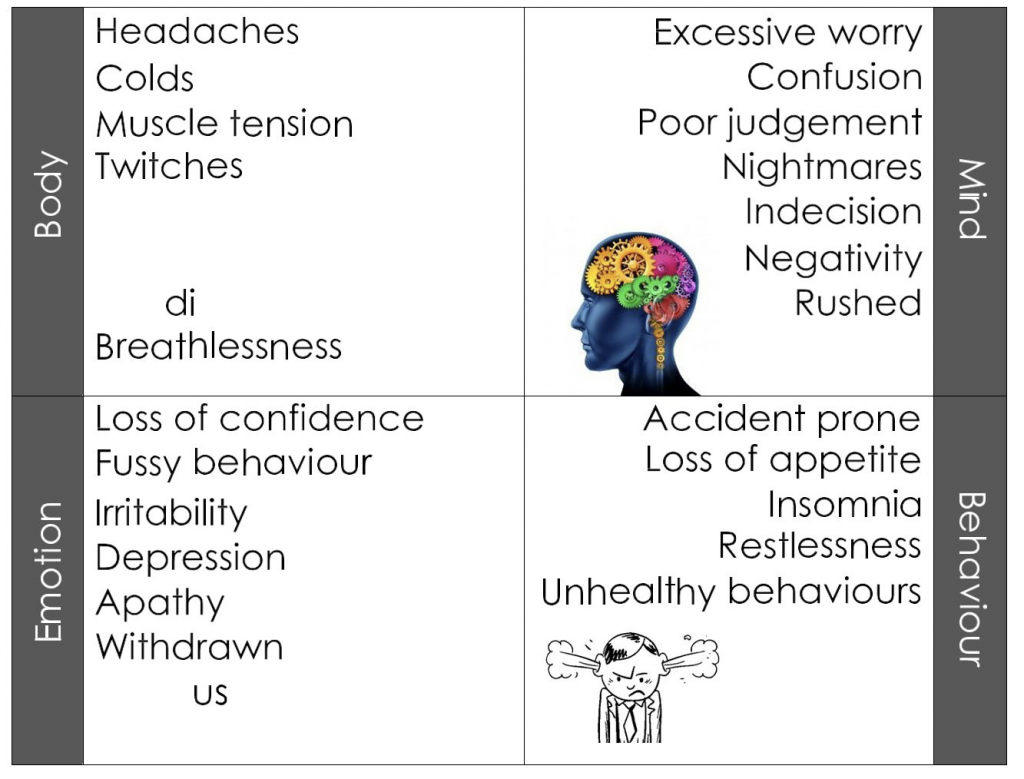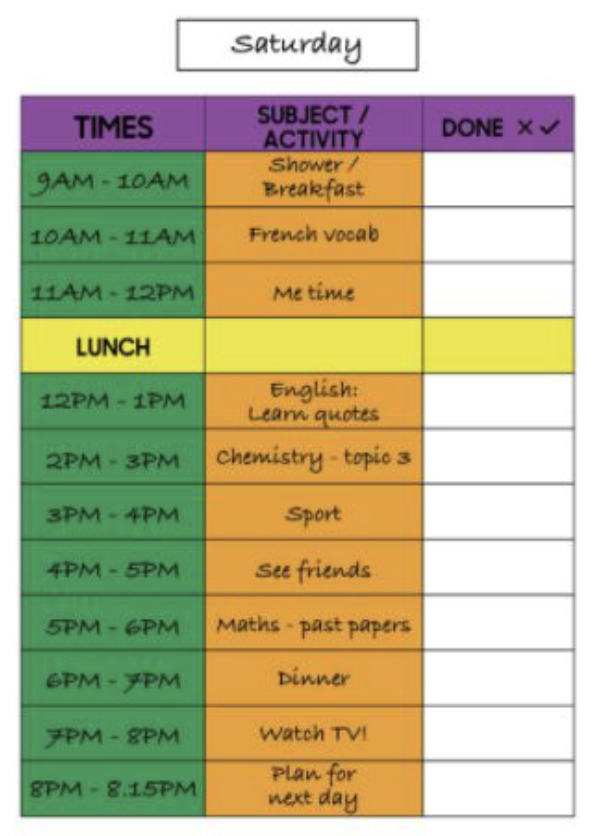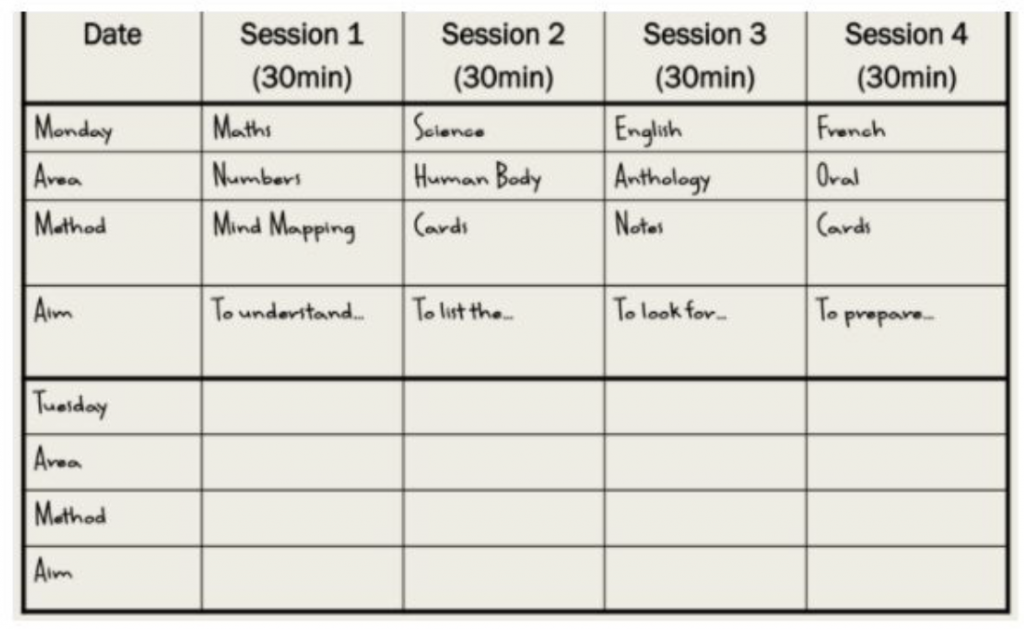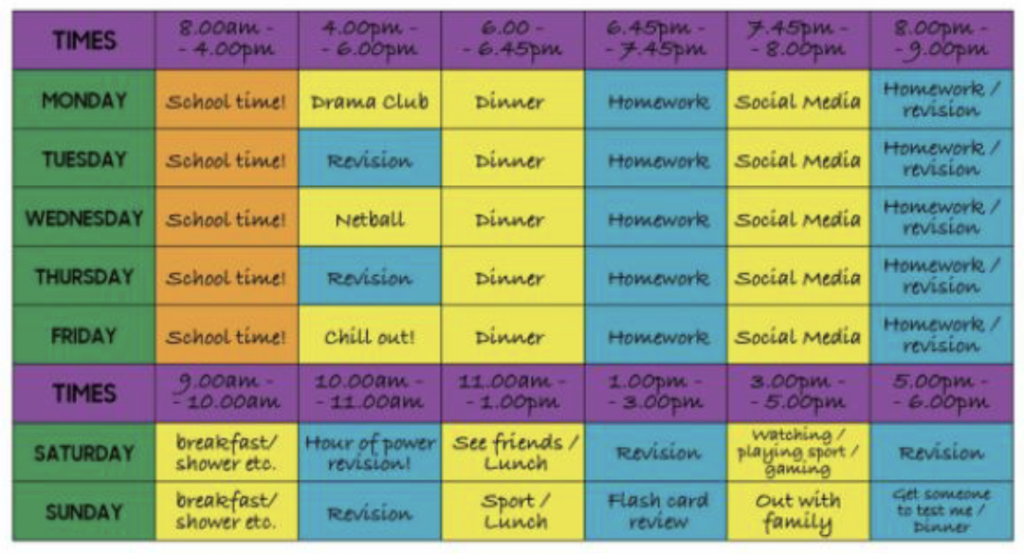Revision for Parents/Carers
How can you help?
- Help your child to set up their revision plan
- Make sure that your child is sticking to their revision plan
- No revision is perfect: sticking to the plan 80% of the time is reasonable!
- Sometimes it will all get on top of your child. Remind them that they have worked hard and they are in a good position.
- Avoid nagging, but gentle revision reminders are helpful.
- Ensure that your child knows what key exam and coursework dates are upcoming.
- Make sure your child has all the equipment that they need (black and purple pens, pencils, rubber, ruler, maths set and calculator). If you require support please contact the school.
- During the revision period, highlighters, large pieces of paper, and post-it notes are also really useful. Revision guides, revision cards and revision apps are also handy.
- On the night before an exam, your wonderful teenager may be stressed and difficult to be around, but you may have to let that slip!
- Try not to talk about what it was like ‘in your day’. Things have changed a great deal, and it’s likely to irritate your child if they think you just don’t get it.
- Be interested; ask questions about revision subjects! They may even teach you something you haven’t seen in a little while.
- Whatever your child might say, all the research says that TV and music (unless it has no words) in the background does NOT help you to revise. It should be relatively quiet too… There are several YouTube videos that contain music which is ideal for studying:
- Mobile Phones and other devices are likely to cause distraction unless specifically being used to revise. Social media will hinder retention of information.
- Help your child to organise and file their learning.
- A watch or clock is a great way to monitor a set amount of time to study. As this time elapses, move on to your next designated activity.
- Tell them you love them no matter what, regularly!
Home Learning
There is one huge misconception about home learning which a surprising number of people still cling to. The misconception is this: the reason for completing my home learning is so that the relevant teacher will moan/contact my tutor/contact my parents/generally make my life unpleasant. That is not the reason for doing home learning.
There are two main points to home learning: firstly for the teacher to check that you understand the work and have grasped the relevant concepts and secondly, and equally importantly, for you to practise required techniques, check you understand the work and have grasped the relevant techniques.
Copying home learning from someone else and passing work off as your own serves no purpose. Apart from the dishonesty of it, how can a teacher help when they are not seeing your own effort? Don’t fool yourself into thinking, ‘Oh yes I could probably have done that myself – I think I understand what I’m copying.’ If you understand it, then do it yourself. If you don’t understand, ask.
Be aware that what goes around comes around. Teachers will always be willing to help you as much as they can but bear in mind they are much more likely to go that extra mile with you if you have shown your commitment. In the same vein, don’t be afraid to ask for help with home learning – before it is due in. There is no point on the day home learning is due saying ‘Oh, I couldn’t do these three questions.’ You should have contacted the teacher long before then. Similarly, writing the question number and no working does not constitute a reasonable attempt at a home learning question.
Do not be under the misapprehension that the home learning process finishes with the handing in of the piece of work. A crucially important part of the process is sorting out mistakes you have made and learning from them.
Revision and home learning are two different activities and your home learning should be completed before completing your revision. Separate hours should be set aside for your revision and this should be timetabled.
Stress
Looking out for signs:
Stress is the feeling of being under too much mental or emotional pressure. Pressure turns into stress when you feel unable to cope. People have different ways of reacting to stress, so a situation that feels stressful to one person may be motivating to someone else.
As a parent, one thing you need to look out for is evidence of stress. A small amount of stress and adrenaline is good, but too much stress can have a massive impact on revision and general mental health.

While you might not to be able to get rid of exam stress, you can perhaps help your child to deal with other sources of stress, so that exams are less of a focus.
The Signs and Stress Relief:

- Sport is extremely helpful: a walk, a run, a team sport
- A film night or family meal
- Listening to music
- Managing time effectively; use a revision plan and stick to it to avoid last minute panic
- Keep a checklist of everything that needs to be revised. Being able to cross things off the list makes the revision seem like it’s getting somewhere.
A series of subject checklists will be provided. Please speak with your class teachers if you have not received these.
Sleep
Keeping Routine
A lot of youngsters report that they aren’t sleeping well (especially at this time of year and with lockdown) and don’t know what to do about it. Some useful information on the subject:
- Sleep is when the body recharges its batteries
- Without adequate sleep, our ability to think, to remember and to interact with others is impaired. We make poorly considered decisions, think slowly and forget things when we are tired. Exam season is the worst time to suffer from problems like these.
- Biologically, teenagers feel tired later in the evenings than adults do, which means they play on phones, tablets, consoles, watch TV etc to pass the time.
- Evidence shows that looking at a screen last thing at night actually keeps the brain awake (the light from screens stimulates melatonin, which is the chemical that keeps us awake). Therefore access to electronic devices just before bed stops young people from sleeping!
So how can you help your fabulous teenager to get a better night’s sleep?
- Our bodies work well if they stick to routines. It is helpful to have the same sleep routine at weekends and during the week.
- It’s better to have a nap for 20 minutes during the day than to have a lie-in.
- Something calming (drawing, reading, having a bath. talking etc) before bed aids rest.
- Doing exercise during the day
- Having a notebook by the bed allows your child to write any worries or concerns down to get them off their mind before sleep.
- Avoid caffeine after 8pm.
- Comfortable sleeping environments (clean bedding, a long bath etc) can enhance deep sleep.
- Encourage a quiet sleeping environment; no music, other people in the house talking quietly, phones in the room switched OFF…
- Don’t eat or drink too much too late.
Working Together
Your notes, as a parent/carer
Use this document to make notes on:
- What exams and coursework are upcoming
- What dates are they due/on?
Find out what revision methods your child finds effective:
How do I create an effective revision Schedule?
- Decide upon a format for your timetable. There are lots of ideas and templates online. You will also find some here. Alternatively, you could use your smartphone calendar or Google calendar. Look up ‘The Exam Coach’ – he has some feel most to least confident with. fantastic videos explaining how you can do this! Colour-coding these might help too. Once you’re familiar with a variety of strategies, matching these to your aim and adding them to your timetable would also be helpful.
- Make a list of all of your subjects and rank them in order of which subjects you feel most to least confident with.
- Make a list of all the topics within each subject and rank them in order of which topics you feel most to least confident with. If you’re not sure what the topics are, ask your teacher.
By doing this, when you check your timetable to see which subject you have chosen to study, you can check your topic list for a revision focus. Start with the topic you feel least confident with. - Set definite times to start and finish revision sessions. Include other commitments ( e.g. school, mucking out the stables, your part-time job) and downtime. Yes, that’s important too!
- Review your timetable at the end of every week and amend if you need to. The most important thing about this is that it works for YOU!











